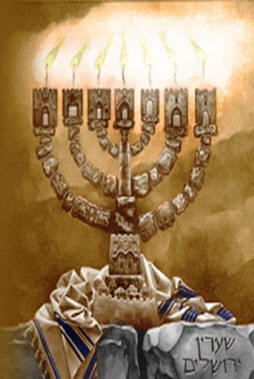Hanukkah: The Triumph of Justice Over Injustice

For over two thousand years, the festival of Hanukkah has stood as a testament to Jewish resilience and faith. From the miraculous oil that burned for eight nights to the courageous Maccabean revolt, Hanukkah presents a powerful narrative of hope and dedication that continues to inspire.
A History of Resilience
Rooted in the inception of Judaism, the history of the Jews has witnessed numerous ups and downs. Yet, despite the differences, dispersions, captivities, and the grave injustices and discriminations, the Jewish people continued to survive and preserve their existence. Like steel tempered in the furnace of time, they emerged stronger, committed to their mission. They awakened human values during the dark periods of history. This enduring strength and commitment to tradition is celebrated each year during Hanukkah, a festival that not only marks a historical victory but also the spiritual resilience of the Jewish people.
Hanukkah
More than two thousand years after the first celebration, Hanukkah has remained a symbol of historical revolution in Jewish culture. Each year, Jews celebrate Hanukkah on the twenty-fifth day of the Hebrew month of Kislev for eight nights, in remembrance of their history and with particular rituals.
Meaning of Hanukkah
The word “Hanukkah” means inauguration and dedication in Hebrew culture. For us, it is a celebration marking the rededication of the Holy Temple by the Maccabees on the 25th of Kislev, 3596 in the Hebrew calendar, corresponding to 165 BC.
The miracle of Hanukkah
Hanukkah commemorates the miracles of the Divine Essence, including the victory of the Jews led by Matityahu the High Priest Hasmonean over the Greek pagans, the reclamation and purification of the Holy Temple from Greek idols, and the miraculous burning of a small amount of sacred olive oil in the seven-branched menorah for eight days and nights in Solomon’s Holy Temple.
The ritual of lighting candles
In remembrance of the miraculous burning of the sacred olive oil, two candles are lit on the first night and one candle is added each night after. During the lighting, we thank God, who always extends grace and kindness to us humans. Traditionally, it was customary to place the candles behind a window after being lit.
The Greek Oppression
On the 25th of Kislev, 168 BCE, soldiers of Antiochus IV, the fourth Greek ruler, placed a statue of Zeus inside Solomon’s Temple and built an altar there to honor their god. Antiochus also ordered that the teaching of the Torah and the observance of its religious ceremonies, especially keeping the Sabbath, be forbidden. Even possessing a copy of the Torah was considered a crime, immediately punished by death.
Jewish resistance
Some Jews willingly accepted these shameful decrees without resistance, believing that embracing the captivating culture of Greece was a mark of sophistication and civilization. This small group, known as the Hellenists, unknowingly risked their lineage’s assimilation. However, many others were determined to preserve their faith, preferring to leave the Holy City rather than witness further desecration of their sacred rites. They refused to participate in the celebration of Zeus. The majority, known as the Hasidim, sought refuge in the caves and mountains around Jerusalem, believing that God would not forget them and would soon send a leader, the Messiah, to save them.
Antiochus’ cultural campaign
Deeply devoted to spreading Greek culture, Antiochus aimed to transform every aspect of his occupied territories to reflect Greek influence — from art and architecture to the personal beliefs of the inhabitants. After the Greek conquest of Judea, he ordered the plundering of the valuable treasures of Solomon’s Temple and resources, quickly spreading Greek culture in Jerusalem. However, continuous Jewish resistance and revolts prompted him to attack Jerusalem again, setting the city on fire, massacring thousands, and taking women and children captive to take revenge on those who refused to bow to anything but the One God, including the human-made Greek gods. But all this wasn’t enough for Antiochus.
Antiochus’ ultimate goal
Antiochus wanted to eliminate monotheism, which was prevalent only in the Holy Land. He aimed to eradicate Judaism once and for all and fully Hellenize the Jews. Antiochus, aware of the emerging threat from Rome, took decisive action to reinforce the fragile state of the Seleucid Empire. He understood that a unified culture under Greek civilization could act as a stabilizing force. By methodically replacing the diverse religions of his subjects with Greek traditions, he wasn’t just preserving his rule; he was setting the stage for expansion.
Jewish martyrs
Many Jews achieved martyrdom in this struggle, including Eleazar the elderly priest, who was brutally killed for refusing to eat pork. Hannah, a mother from whom Antiochus demanded that she and her seven sons bow to the Greek gods, witnessed her sons being severely tortured and killed one by one for refusing to obey. However, Hannah’s faith remained unshakably strong. Despite her heart being broken numerous times, her faith never wavered. As she whispered her prayers, she peacefully passed away, closing her eyes to the world. . The severe repression and cultural assimilation attempts by Antiochus set the stage for an organized resistance.

The Maccabean revolt
Soon, the banner of rebellion was raised against Greek oppression by the Maccabees. The first step of opposition against Antiochus and his actions was led by an elderly priest from the town of Modi’in named Matityahu and his five sons. Judah, Matityahu’s son, known as Maccabee, organized the core of this resistance group. He gathered discontented people and formed guerrilla groups, launching repeated attacks on villages where Greek mercenaries were stationed. Judah, known as the Maccabee, repeatedly defeated Antiochus’s armies, eventually forming the Maccabean force and, in 165 BC, entering Jerusalem after crushing the enemy forces.
The rededication of the Temple
The first action of the Maccabees was to cleanse, repair, and purify the Holy Temple. Then, on the twenty-fifth day of Kislev, after nine years, they reopened the Holy Temple with special religious ceremonies accompanied by festivities. This celebration lasted for eight days, which is why Jews celebrate Hanukkah for eight days in memory of that event.
Important Points about Hanukkah Laws and Rituals
- Hanukkah begins on the night of the twenty-fifth of Kislev and continues for eight nights.
- On the first night, in addition to the Shamash candle, one candle is lit. With each subsequent night, an additional candle is added. The Shamash candle serves to light the others.
- On the first night, three blessings (Brachot) are recited over the candles, and on the other nights of Hanukkah, two blessings are recited.
The First Berakhah
בָּרוּךְ אַתָּה אֲדֹנָי אֱלֹהֵינוּ מֶלֶךְ הָעוֹלָם אֲשֶׁר קִדְּשָׁנוּ בְּמִצְוֹתָיו וְצִוָּנוּ לְהַדְלִיק נֵר של חֲנֻכָּה
Blessed are You, Lord our God, King of the universe, who has sanctified us with His commandments and commanded us to light the special Hanukkah lights.
The Second Berakhah
בָּרוּךְ אַתָּה אֲדֹנָי אֱלֹהֵינוּ מֶלֶךְ הָעוֹלָם שֶׁעָשָׂה נִסִּים לַאֲבוֹתֵינוּ בַּיָּמִים הָהֵם בזְּמַן הַזֶּה
Blessed are You, Lord our God, King of the universe, who performed miracles for our ancestors in such days at those times.
The Third Berakhah (recited only on the first night)
ברוּךְ אַתָּה אֲדֹנָי אֱלֹהֵינוּ מֶלֶךְ הָעוֹלָם שֶׁהֶחֱיָנוּ וְקִיְּמָנוּ וְהִגִּיעָנוּ לַזְּמַן הַזֶּה
Blessed are You, Lord our God, King of the universe, who has kept us alive, sustained us, and brought us to this season. Your name is blessed.
The Shehecheyanu Berakhah
The Shehecheyanu blessing should be recited on the first night of Hanukkah. If forgotten, it can be recited on subsequent nights.
Further points
- Since the Hanukkah miracle involved olive oil, it is preferable to use olive oil with a wick for lighting the Hanukkah candles. If olive oil is not available, any edible oil or candle may be used instead.
- The Hanukkah candles are typically lit after the Arvit tefillah (the evening prayer), just after sunset, and they should burn for at least half an hour.
- Both men and women are required to perform the Hanukkah mitzvah.
- It is customary to place the Hanukkah candles in a window where they can be seen by the public.
- Before the start of the Sabbath, the Hanukkah candles are lit first, followed by the Sabbath candles.
- After the Sabbath ends, the Havdalah blessing is recited first, and the Hanukkah candles are lit after the recitation is finished.



 فارسی
فارسی